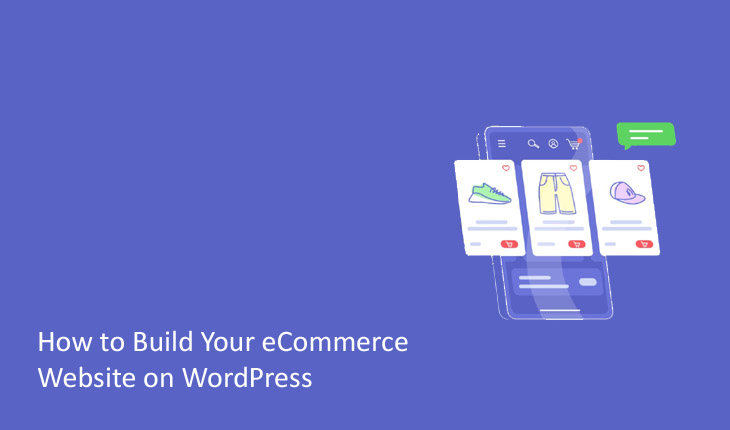Right now, it’s the perfect moment to launch an internet-based business, and WordPress simplifies the process. WordPress offers a variety of features that assist in creating a full-fledged eCommerce platform for the sale of various products. How to Build Your eCommerce Website on WordPress
Whether you’re a seasoned web developer or a total novice in the realm of online sales, it doesn’t make a difference. You can transform your WordPress site into a virtual shop in a matter of steps.
Moreover, the most advantageous aspect is that numerous choices are available for all budgets.
Can WordPress be used for eCommerce?
WordPress’s user-friendly interface and extensive library of themes and plugins make it easy for businesses to create and manage their eCommerce websites without the need for advanced technical skills. Additionally,
the platform’s scalability allows businesses to grow and expand their online stores as their needs evolve, ensuring that WordPress remains a versatile and reliable solution for eCommerce.
1. Pick a WooCommerce Hosting Plan
Choosing the right hosting plan for your WooCommerce store is crucial. A plan with good performance will ensure fast loading times and reliable uptime for your online store.
Look for a hosting provider that offers specialized WooCommerce hosting, as it will come with features tailored to the needs of an e-commerce platform like WooCommerce. This includes optimized server configurations, automatic updates for WooCommerce, and expert support to help you with any technical issues that may arise. Web Hosting
When selecting a hosting plan for your WooCommerce store, consider factors such as scalability and security. Scalability is important to accommodate growth in traffic and sales volume, ensuring your store can handle increased demand without experiencing performance issues.
Additionally, robust security measures such as SSL certificates, regular backups, and malware detection are essential to protect customer data and maintain trust in your online store. By prioritizing performance, scalability, and security in your hosting plan, you can create a reliable and secure shopping experience for your customers.
2. Choose a Domain Name
Selecting a domain name is crucial for establishing an online presence. It should be easy to remember, reflective of your brand, and preferably short to avoid typing errors.
Consider incorporating keywords related to your business to improve search engine visibility. A well-chosen domain name can significantly impact your website’s success.
When choosing a domain name, it is also important to check for the availability of the name across different social media platforms. Consistent branding across all online channels can enhance brand recognition and make it easier for customers to find and engage with your business.
Additionally, selecting a domain extension that aligns with your industry or target audience can further strengthen your online presence and credibility.
3. Choose a WordPress eCommerce Themes
When selecting WordPress eCommerce themes, consider factors like customization options, responsiveness, and compatibility with popular plugins. A theme that offers a variety of design options can help create a unique online store.
Ensure the theme is mobile-friendly for a seamless shopping experience on different devices. Compatibility with eCommerce plugins like WooCommerce can enhance the functionality of your store, making it easier to manage products and payments.
Additionally, it is essential to choose a theme that provides good support and regular updates to ensure the security and performance of your online store. Themes that offer documentation and customer support can be valuable in case you encounter any issues or need assistance with setting up your eCommerce site.
Prioritize themes that have positive reviews and ratings from other users to help you make an informed decision on the best WordPress eCommerce theme for your business.
4. Choose WordPress eCommerce Plugins
For all these eCommerce platforms, customer relationship management is crucial for building brand loyalty and driving repeat purchases. Integrating CRM marketing strategies with these platforms can help businesses tailor marketing efforts based on customer
behavior and preferences, ultimately leading to increased sales and customer satisfaction. By utilizing CRM tools in conjunction with these eCommerce solutions, businesses can streamline their marketing efforts and create more personalized experiences for their customers.
By integrating CRM tools with eCommerce platforms like WooCommerce, Easy Digital Downloads, and WP eCommerce, businesses can gain valuable insights into customer behavior, purchase history, and preferences. This information can then be utilized to create targeted marketing campaigns, personalized product recommendations,
and tailored promotions. By leveraging CRM marketing strategies within these platforms, businesses can enhance customer engagement, drive conversions, and foster long-term customer loyalty.
Final Thoughts
E-commerce is rapidly expanding globally, with numerous customers expressing their preference for online shopping over traditional methods.
Currently, individuals looking to sell their goods have the opportunity to create an online shop. Should you be interested in following suit, WordPress stands out as a viable option. It simplifies the process, offering eCommerce solutions that cater to a wide range of budgets and skill levels.
For further information on our web hosting services, particularly our latest Managed WordPress hosting solution, explore our detailed information on Bluehost.com.
Frequently Asked Questions (FAQs)

